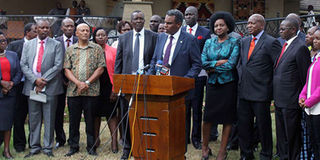Maraga and Haji strike deal to bolster anti-graft war

Director of Public Prosecutions Noordin Haji, after attending a multi-agency meeting on the fight against corruption, addresses journalists in Naivasha on February 7, 2019. They agreed that collaborative efforts are needed to win the war. PHOTO | JOHN NJOROGE | NATION MEDIA GROUP
What you need to know:
- The members agreed to have positive engagements and encourage a culture of inter-agency consultations on matters of common interest.
- The council also agreed that it will endeavour to use technology in the whole justice sector from investigations, prosecutions and judicial processes.
The blame game between the Judiciary and the Director of Public Prosecutions Noordin Haji over evidence presented in court is likely to cease after the two institutions agreed to close ranks in the fight against graft.
Chief Justice David Maraga, addressing the media on Thursday during a meeting of the National Council on Administration of Justice (NCAJ) at the Enashipai Hotel in Naivasha, said it was the prerogative of the DPP to adduce evidence before courts.
Mr Maraga clarified that it is only after a case is concluded that the evidence could be termed “weak”.
And it was the prerogative of the DPP to withdraw a case, reduce or add charges, and the Judiciary would not stop such a move, the CJ said.
The Judiciary has in recent times come under criticism from President Uhuru Kenyatta and Mr Haji, who accused courts of slowing down the fight against corruption.
APPROACH
During the meeting in Naivasha, NCAJ members unanimously agreed on nine proposals in a bid to achieve the desired goals in the administration of justice.
They also resolved to adopt a collaborative approach to boost efficiency in serving Kenyans. The members also agreed to have positive engagements and encourage a culture of inter-agency consultations on matters of common interest.
Among the new approaches to be adopted by the NCAJ is the integration of plea bargaining in criminal justice in order to expedite court cases.
Mr Maraga and Mr Haji were in agreement over the use of the plea bargain tool in the fight against corruption, insisting that it is common practice worldwide.
“If somebody pleads guilty and promises to pay back what is stolen, then such a person can get away with a lighter sentence and the stolen assets recovered … that is a lot better,” Mr Maraga said.
PLEA BARGAIN
For his part, Mr Haji said the intention of the prosecution is not to cripple institutions, citing the NYS 2 case, where they were willing to listen to such an arrangement.
“Of course we are still subject to the Judiciary. That is the oversight mechanism that we have put in place so that we are not accused of abusing such opportunities,” the DPP boss said.
He added: “We are determined to come up with much clearer guidelines about plea bargaining and how it will be applied in graft cases.”
The plea bargain guidelines set out the process by which a prosecutor may negotiate with an accused person or their legal representative on proposed charges in a particular case.
The council also agreed that it will endeavour to use technology in the whole justice sector from investigations, prosecutions and judicial processes.
This will include, where necessary, prompting legislative changes to allow evidence from non-traditional sources such as CCTV.
In a joint statement read by Judiciary Chief Registrar Anne Amadi, the NCAJ members pledged to carry out their respective duties through a collaborative approach.





